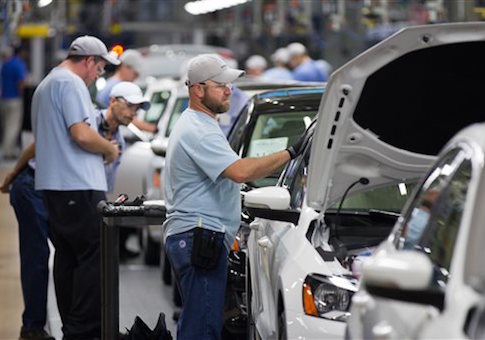Volkswagen’s decision to allow multiple employee representatives at the bargaining table could undermine America’s longstanding practice of majority rule in labor relations, according to legal experts.
David Phippen, a management-side labor lawyer with Constangy, Brooks, & Smith, said VW’s policy embraces the European concept of "minority bargaining representation" and represents a further drift away from traditional American labor organizations.
"Under current law an employer is not supposed to bargain legally with a union that doesn’t purportedly represent a majority bargaining unit," Phippen said.
Unionization in the United States has historically been a winner-take-all game. Labor organizations that surpassed the 50 percent threshold in secret ballot elections or card check campaigns are able to represent 100 percent of the workforce. Those that only manage 49.9 percent of the vote go home empty-handed.
VW, a German-based automaker, and the UAW, the Detroit-based labor giant in decline, are pioneering a third way. UAW only managed to attract 47 percent support from VW workers in right to work Tennessee during in its failed February secret ballot election. Rather than abiding by its contractual obligation to abandon organizing at the Chattanooga plant for at least one year, the UAW formed a "volunteer union" in July to give workers an outlet for their support. The union launched a similar effort at an Alabama Mercedes plant in October.
"The UAW’s attempts in Tennessee and Alabama are a veiled attempt to create a situation that brings minority union bargaining to a head," Phippen said.
Labor activists and regulators have been drifting away from the majority exclusive bargaining model that has defined U.S. labor relations to deal with sagging union membership rates.
The NLRB departed from decades of precedent in 2011 by approving "micro-union" campaigns, in which unions could win a seat at the bargaining table by organizing majorities individual store departments, rather than the workforce. Shoe departments within major retailers have since become union shops, while the men’s wear department is union-free. Republicans have since introduced legislation to outlaw micro unions.
Rep. Phil Roe (R., Tenn.), chairman of the House Subcommittee on Health, Education, Labor, & Pensions, said that VW’s policy moves beyond micro unions to further undermine democratic rule in the workplace.
"Democracy works better when you allow a secret ballot vote and respect their decision," he said.
VW’s policy, which was released Wednesday, states that any employee group that garners support from more than 15 percent of the 1,500 person workforce can engage with the human resources department and management about workplace conditions.
Roe said that he is concerned that VW’s policy will become an engine for dividing workplaces and workers under the guise of representation. Majority rule and exclusive bargaining are designed to maintain labor harmony no matter the outcome of the vote.
"This is a disaster for Volkswagen. I can’t imagine how a large plant could cooperate with micro unions. It’s not the way unions have worked here," he said. "I don’t think it would make investors look more favorably on our state."
The VW policy is also careful not to run afoul of existing labor law. Employee groups cannot collectively bargain on behalf of their members until they cross the 50 percent threshold.
"Any organization which requests recognition as an exclusive bargaining partner must comply fully with the National Labor Relations Act," the policy says.
UAW Secretary Treasurer Gary Casteel said on Wednesday that the voluntary union "is in excess of a majority of workers at the plant," which could qualify them for exclusive bargaining rights. The National Right to Work Committee said that this caveat indicates that the company is looking to tilt the scales in favor of the UAW.
"This new policy makes it even more likely that workers will be misled into signing cards that can later be used to impose the UAW on all workers, even those who want nothing to do with it," NRCW vice president Patrick Semmens said in a statement.
Other labor watchdogs see the VW policy as opening the door for competition in the workplace, giving employees access to union alternatives. A group of VW employees has done just that, forming the American Council of Employees (ACE) in October.
ACE president Sean Moss, a quality inspector at the plant, said that his nonprofit labor organization’s goal is to beat the UAW’s recruitment efforts.
Attracting majority support through a secret ballot election or card check campaign is an expensive endeavor, which is why deep-pocketed unions have had a monopoly on organizing. Giving minority groups the ability to demonstrate their value to their co-workers firsthand could become a useful recruitment tool for a start-up labor group, according to Moss.
"I’m getting phone calls and new membership cards everyday," he said. "A lot of people looked at this [policy] and said it’s a handout to the UAW. Another way of looking at it is VW recognized the need for ACE and the voice of local employees because we are pro-Chattanooga, pro-VW, and pro-worker."
